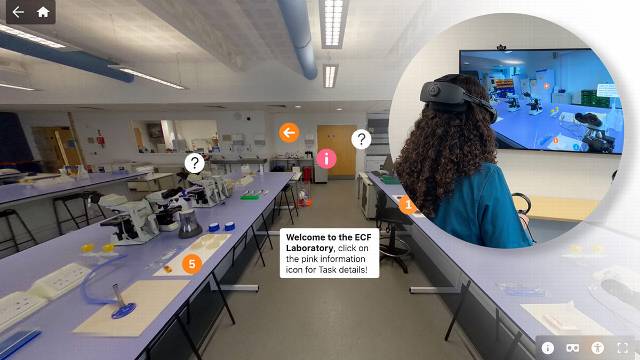
Harper offers a range of taught and research led postgraduate qualifications to help you make the next step in your journey. Whether you’re looking to climb the career ladder to new heights or specialise in an area of research, our degrees that matter will help you to do just that.
A Masters of Research is a unique opportunity to deep-dive into a subject, understand its intricacies, and contribute to the sector as a specialist in your field. Dr Lynn McIntyre, Senior Lecturer in Food Safety in the Department of Food Technology and Innovation, is looking to help fund a new researcher to join her in her latest venture in further understanding meat spoilage issues starting this September.
With a project title of Assessing the utility of the RoboScientific Bloodhound VOC analyser to rapidly detect specific meat spoilage issues, Dr McIntyre explained the aims of the project: “While we place great emphasis on food safety, we tend to forget that quality is a bigger driver of consumer complaints for the meat industry. And these complaints are often a consequence of the type of packaging used, rather than a problem with microbial spoilage of products.
"This research project offers a great opportunity to characterise these quality issues using a novel combination of detection methods during shelf-life, and will hopefully provide valuable insights for meat processors on differentiating between odours related to packaging type and off-odours related to microbial spoilage.
"The RoboScientific Bloodhound VOC analyser is a biosensor system that detects the presence of volatile organic compounds (VOCs) that contribute to the characteristic odour of substances.
“This approach can be applied to various situations where VOCs are produced, including microbial growth and the detection of diseases during animal and plant production.
“In consultation with a red meat producer, we have developed a shelf-life testing protocol to assess the utility of the RoboScientific VOC analyser to rapidly detect spoilage in vacuum packaged beef joints.
“We propose using the VOC analyser in parallel with the quantitative analysis of LAB populations and Total Volatile Base Nitrogen, as a specific measure of meat freshness, to assess how well these three methods assess the level of spoilage that develops during long-term - less than 70 days - storage.
“This research, in conjunction with RoboScientific, will fine tune the sensors, primarily by manipulating the sensor materials, using pure cultures of typical LAB spoilage organisms to make the analyser more specific and sensitive to the VOCs typically produced by target organisms. This in turn will allow us to determine whether the Bloodhound can be utilised to detect spoilage based on the VOCs produced within vacuum packaged meat products.”
With much to discover and learn over the course of a year, the student looking to take on this opportunity will be partly funded by The Worshipful Company of Butchers; they are looking to gain an insight into the value of the Bloodhound VOC analyser to specifically detect the emergence of various microbial safety and quality issues. Being part of such an extended project gives students the chance to collaborate on previous material while also giving their stance on the future of the food industry as we know it.
If you’re intrigued by this exciting research path, you can get in touch with Dr McIntyre here. To see more about our other postgraduate pathways, click here.
 Blog: Veterinary Medicine students step into immersive 360° laboratory
At Harper & Keele Veterinary School, students are stepping beyond the traditional microbiology bench and into an immersive 360° labo …
Posted
Yesterday
Blog: Veterinary Medicine students step into immersive 360° laboratory
At Harper & Keele Veterinary School, students are stepping beyond the traditional microbiology bench and into an immersive 360° labo …
Posted
Yesterday





